| Listing 1 - 10 of 25 | << page >> |
Sort by
|
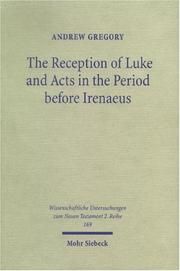
ISBN: 3161480864 9783161480867 Year: 2003 Volume: 169 Publisher: Tübingen: Mohr Siebeck,
Abstract | Keywords | Export | Availability | Bookmark
 Loading...
Loading...Choose an application
- Reference Manager
- EndNote
- RefWorks (Direct export to RefWorks)
Bible --- Criticism, interpretation, etc --- History --- 226.4 --- 226.6 --- 276:22 --- Evangelie volgens Lucas --- Handelingen der apostelen. Akten van de apostelen --- Patrologie en exegese --- 276:22 Patrologie en exegese --- Bible. --- Luc (Book of the New Testament) --- Lucas (Book of the New Testament) --- Luka (Book of the New Testament) --- Lukan săn zăn︠g︡g (Book of the New Testament) --- Lukas (Book of the New Testament) --- Luke (Book of the New Testament) --- Lūqā (Book of the New Testament) --- Nuga pogŭm (Book of the New Testament) --- Ruka den --- Ruka ni yoru fukuinsho --- Acts (Book of the New Testament) --- Acts of the Apostles --- Chongdo haengjŏn --- Sado haengjŏn --- Criticism, interpretation, etc.
Book
ISBN: 9781472507792 9781472508928 9781472506252 1472506251 1472507797 1472508920 9781472593146 1472593146 Year: 2016 Publisher: London
Abstract | Keywords | Export | Availability | Bookmark
 Loading...
Loading...Choose an application
- Reference Manager
- EndNote
- RefWorks (Direct export to RefWorks)
"Anaximander, the sixth-century BCE philosopher of Miletus, is often credited as being the instigator of both science and philosophy. The first recorded philosopher to posit the idea of the boundless cosmos, he was also the first to attempt to explain the origins of the world and humankind in rational terms. Anaximander's philosophy encompasses theories of justice, cosmogony, geometry, cosmology, zoology and meteorology. Anaximander: A Re-assessment draws together these wide-ranging threads into a single, coherent picture of the man, his worldview and his legacy to the history of thought. Arguing that Anaximander's statements are both apodeictic and based on observation of the world around him, Andrew Gregory examines how Anaximander's theories can all be construed in such a way that they are consistent with and supportive of each other. This includes the tenet that the philosophical elements of Anaximander's thought (his account of the apeiron, the extant fragment) can be harmonised to support his views on the natural world. The work further explores how these theories relate to early Greek thought and in particular conceptions of theogony and meterology in Hesiod and Homer."-- Anaximander, the sixth-century BCE philosopher of Miletus, is often credited as being the instigator of both science and philosophy. The first recorded philosopher to posit the idea of the boundless cosmos, he was also the first to attempt to explain the origins of the world and humankind in rational terms. Anaximander's philosophy encompasses theories of justice, cosmogony, geometry, cosmology, zoology and meteorology. Anaximander: A Re-assessment draws together these wide-ranging threads into a single, coherent picture of the man, his worldview and his legacy to the history of thought. Arguing that Anaximander's statements are both apodeictic and based on observation of the world around him, Andrew Gregory examines how Anaximander's theories can all be construed in such a way that they are consistent with and supportive of each other. This includes the tenet that the philosophical elements of Anaximander's thought (his account of the apeiron, the extant fragment) can be harmonised to support his views on the natural world. The work further explores how these theories relate to early Greek thought and in particular conceptions of theogony and meterology in Hesiod and Homer
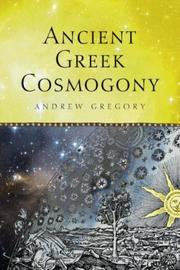
ISBN: 9780715634776 0715634771 Year: 2007 Publisher: London : Duckworth,
Abstract | Keywords | Export | Availability | Bookmark
 Loading...
Loading...Choose an application
- Reference Manager
- EndNote
- RefWorks (Direct export to RefWorks)
Cosmogony, Greek. --- Philosophy, Ancient. --- Philosophy and science --- Cosmogonie grecque --- Philosophie ancienne --- Philosophie et sciences --- History --- Histoire
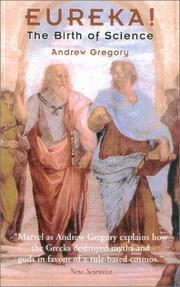
ISBN: 9781840463743 1840463740 Year: 2003 Publisher: Cambridge: Icon Books,
Abstract | Keywords | Export | Availability | Bookmark
 Loading...
Loading...Choose an application
- Reference Manager
- EndNote
- RefWorks (Direct export to RefWorks)
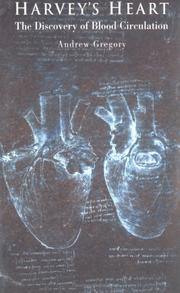
ISBN: 1840462485 Year: 2001 Publisher: Cambridge : Icon Books,
Abstract | Keywords | Export | Availability | Bookmark
 Loading...
Loading...Choose an application
- Reference Manager
- EndNote
- RefWorks (Direct export to RefWorks)
Blood --- Circulation --- History --- Harvey, William,
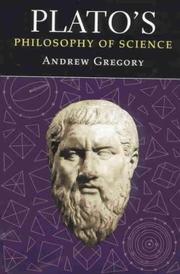
ISBN: 1472502388 1472597850 147250237X 9781472502384 9781472597854 9781472502377 0715629875 9780715629871 Year: 2000 Publisher: London Duckworth
Abstract | Keywords | Export | Availability | Bookmark
 Loading...
Loading...Choose an application
- Reference Manager
- EndNote
- RefWorks (Direct export to RefWorks)
In this illuminating book Andrew Gregory takes an original approach to Plato's philosophy of science by reassessing Plato's views on how we might investigate and explain the natural world. He demonstrates that many of the common charges against Plato - disinterest, ignorance, dismissal of observation - are unfounded, and shows instead that Plato had a series of important and cogent criticisms to make of the early atomists and other physiologoi. Plato's views on science, and on astronomy and cosmology in particular, are shown to have developed in interesting ways. Thus, the book argues, Plato can best be seen as a philosopher struggling with the foundations of scientific realism, and as someone, moreover, who has interesting epistemological, cosmological and nomological reasons for his approach. Plato's Philosophy of Science is important reading for all those with an interest in Ancient Philosophy and the History of Science.
Science --- Science, Ancient. --- Astronomy, Ancient. --- Cosmology, Ancient. --- Atomism. --- Philosophy --- History --- Plato.
Book
ISBN: 9781780932033 Year: 2013 Publisher: London Bloomsbury
Abstract | Keywords | Export | Availability | Bookmark
 Loading...
Loading...Choose an application
- Reference Manager
- EndNote
- RefWorks (Direct export to RefWorks)
Philosophy, Ancient --- Pre-Socratic philosophers --- Supernatural
Book
ISBN: 1472508920 1472593146 1472506251 Year: 2016 Publisher: New York Bloomsbury Academic
Abstract | Keywords | Export | Availability | Bookmark
 Loading...
Loading...Choose an application
- Reference Manager
- EndNote
- RefWorks (Direct export to RefWorks)
"Anaximander, the sixth-century BCE philosopher of Miletus, is often credited as being the instigator of both science and philosophy. The first recorded philosopher to posit the idea of the boundless cosmos, he was also the first to attempt to explain the origins of the world and humankind in rational terms. Anaximander's philosophy encompasses theories of justice, cosmogony, geometry, cosmology, zoology and meteorology. Anaximander: A Re-assessment draws together these wide-ranging threads into a single, coherent picture of the man, his worldview and his legacy to the history of thought. Arguing that Anaximander's statements are both apodeictic and based on observation of the world around him, Andrew Gregory examines how Anaximander's theories can all be construed in such a way that they are consistent with and supportive of each other. This includes the tenet that the philosophical elements of Anaximander's thought (his account of the apeiron, the extant fragment) can be harmonised to support his views on the natural world. The work further explores how these theories relate to early Greek thought and in particular conceptions of theogony and meterology in Hesiod and Homer."-- Anaximander, the sixth-century BCE philosopher of Miletus, is often credited as being the instigator of both science and philosophy. The first recorded philosopher to posit the idea of the boundless cosmos, he was also the first to attempt to explain the origins of the world and humankind in rational terms. Anaximander's philosophy encompasses theories of justice, cosmogony, geometry, cosmology, zoology and meteorology. Anaximander: A Re-assessment draws together these wide-ranging threads into a single, coherent picture of the man, his worldview and his legacy to the history of thought. Arguing that Anaximander's statements are both apodeictic and based on observation of the world around him, Andrew Gregory examines how Anaximander's theories can all be construed in such a way that they are consistent with and supportive of each other. This includes the tenet that the philosophical elements of Anaximander's thought (his account of the apeiron, the extant fragment) can be harmonised to support his views on the natural world. The work further explores how these theories relate to early Greek thought and in particular conceptions of theogony and meterology in Hesiod and Homer
Book
ISBN: 9781350080973 Year: 2020 Publisher: London Bloomsbury
Abstract | Keywords | Export | Availability | Bookmark
 Loading...
Loading...Choose an application
- Reference Manager
- EndNote
- RefWorks (Direct export to RefWorks)

ISBN: 0715629875 Year: 2000 Publisher: London Duckworth
Abstract | Keywords | Export | Availability | Bookmark
 Loading...
Loading...Choose an application
- Reference Manager
- EndNote
- RefWorks (Direct export to RefWorks)
Astronomy, Ancient --- Atomism --- Cosmology, Ancient --- Science, Ancient --- Science --- Philosophy --- History --- Plato.
| Listing 1 - 10 of 25 | << page >> |
Sort by
|

 Search
Search Feedback
Feedback About UniCat
About UniCat  Help
Help News
News